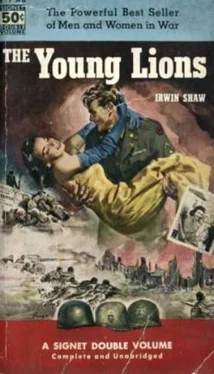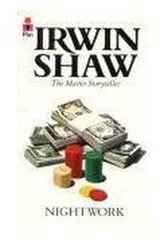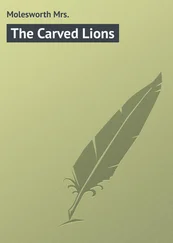Irwin Shaw - The Young Lions
Здесь есть возможность читать онлайн «Irwin Shaw - The Young Lions» весь текст электронной книги совершенно бесплатно (целиком полную версию без сокращений). В некоторых случаях можно слушать аудио, скачать через торрент в формате fb2 и присутствует краткое содержание. Жанр: Классическая проза, на английском языке. Описание произведения, (предисловие) а так же отзывы посетителей доступны на портале библиотеки ЛибКат.
- Название:The Young Lions
- Автор:
- Жанр:
- Год:неизвестен
- ISBN:нет данных
- Рейтинг книги:4 / 5. Голосов: 1
-
Избранное:Добавить в избранное
- Отзывы:
-
Ваша оценка:
- 80
- 1
- 2
- 3
- 4
- 5
The Young Lions: краткое содержание, описание и аннотация
Предлагаем к чтению аннотацию, описание, краткое содержание или предисловие (зависит от того, что написал сам автор книги «The Young Lions»). Если вы не нашли необходимую информацию о книге — напишите в комментариях, мы постараемся отыскать её.
The Young Lions — читать онлайн бесплатно полную книгу (весь текст) целиком
Ниже представлен текст книги, разбитый по страницам. Система сохранения места последней прочитанной страницы, позволяет с удобством читать онлайн бесплатно книгу «The Young Lions», без необходимости каждый раз заново искать на чём Вы остановились. Поставьте закладку, и сможете в любой момент перейти на страницу, на которой закончили чтение.
Интервал:
Закладка:
"Nothing." Margaret sat down. "I was just sitting here admiring your mountains."
"Perhaps you would prefer being left alone?" He even took a tentative step back.
"No," Margaret said. "Really not." She had suddenly realized that she had to talk about what had happened to someone, make some decision in her own mind about what it meant. It would be impossible to tell Joseph, and the ski-instructor invited confidence. He even looked a little like Joseph, dark and intellectual and grave. "Please stay," she said.
He stood before her, his legs slightly apart, his collar open and his hands bare, as though there were no wind and no cold. He was graceful and compact in his beautifully cut ski-clothes. His skin seemed to be naturally olive-coloured under the tan, and his blood pulsed a kind of coral-red under the clear tone of his cheeks.
The ski-instructor took out a packet of cigarettes and offered one to her. She took it and he lit it for her, deftly cupping the match against the wind, his hands firm and certain, masculine and olive-coloured close to her face as he leaned over her.
"Thank you," she said. He nodded and lighted his own cigarette and sat down next to her. They sat there, leaning against the back of the bench, their heads tilted easily back, staring through half-closed eyes at the glory of the mountain before them. The smoke curled slantwise over them and the cigarette tasted rich and heavy against Margaret's morning palate.
"How wonderful," she said.
"What?"
"The hills."
He shrugged. "The enemy," he said.
"What?" she asked.
"The enemy."
She looked at him. His eyes were slitted and his mouth was set in a harsh line. She looked back at the mountains.
"What's the matter with them?" she asked.
"Prison," he said. He moved his feet, in their handsome, strapped and buckled boots. "My prison."
"Why do you say that?" Margaret asked, surprised.
"Don't you think it's an idiotic way for a man to spend his life?" He smiled sourly. "The world is collapsing, the human race is struggling to remain alive, and I devote myself to teaching fat little girls how to slide down a hill without falling on their faces."
What a country, Margaret couldn't help thinking, amused despite herself; even the athletes have weltschmerz.
"If you feel so strongly," she said, "why don't you do something about it?" He laughed soundlessly, without pleasure.
"I tried," he said. "I tried in Vienna seven months. I couldn't bear it here any longer and I went to Vienna. I was going to get a sensible, useful job, if it killed me. Advice: don't try to get a useful job in Vienna these days. I finally got a job. Under-waiter in a restaurant. Carrying dishes for tourists. I came home. At least you can earn a respectable living here. That's Austria for you. For nonsense you can get paid well." He shook his head. "Forgive me," he said.
"For what?"
"For talking like this. Complaining to you. I'm ashamed of myself." He flipped his cigarette away and put his hands in his pockets, hunching his shoulders a little, embarrassedly. "I don't know why I did. So early in the morning, perhaps, and we're the only ones awake on the mountain here. I don't know. Somehow… you seemed so sympathetic. The people up here…" He shrugged. "Oxen. Eat, drink, make money. I wanted to talk to you last night…"
"I'm sorry you didn't," said Margaret. Somehow, sitting there next to him, with his soft, deep voice rolling over his precise German, considerately slow and clear for her uncertain ear, she felt less bruised now, restored and calm again.
"You left so suddenly," he said. "You were crying."
"That was silly," she said flatly. "It's merely a sign I'm not grown up yet."
"You can be very grown up and still cry. Cry hard and often." Margaret felt that he somehow wanted her to know that he, too, wept from time to time. "How old are you?" he asked, abruptly.
"Twenty-one," Margaret said.
He nodded, as though this were a significant fact and one to be reckoned with in all future dealings. "What are you doing in Austria?" he asked.
"I don't know…" Margaret hesitated. "My father died and left me some money. Not much, but some. I decided I wanted to see a little of the world before I settled down…"
"Why did you pick Austria?"
"I don't know. I was studying scene-designing in New York and someone had been in Vienna and said there was a wonderful school there, and it was as good a place as any. Anyway, it was different from America. That was the important thing."
"Do you go to school in Vienna?"
"Yes."
"Is it good?"
"No." She laughed. "Schools are always the same. They seem to help other people, but never yourself."
"Still," he said, turning and looking gravely at her, "you like it?"
"I love it. I love Vienna. Austria."
"Last night," he said, "you were not very fond of Austria."
"No." Then she added, honestly, "Not Austria. Just those people. I wasn't very fond of them."
"The song," he said. "The Horst Wessel song."
She hesitated. "Yes," she said. "I wasn't prepared for it. I didn't think, up there, in a beautiful place like this, so far away from everything…"
"We're not so far away," he said. "Not so far away at all. Are you Jewish?"
"No." That question, Margaret thought, the sudden dividing question of Europe.
"Of course not," he said. "I knew you weren't." He pursed his lips thoughtfully and squinted out across the slope, in what was a characteristic grimace, puzzling and searching. "It's your friend," he said.
"What?"
"The gentleman who is coming up this morning."
"How did you know?"
"I asked," he said.
There was a little silence. What a curious mixture he is, Margaret thought, half bold, half shy, humourless and heavy, yet unexpectedly delicate and perceptive.
"He's Jewish, I suppose." There was no trace of judgment or animosity in the grave polite voice as he spoke.
"Well…" Margaret said, trying to put it straight for him.
"The way you people figure, I suppose he is. He's a Catholic, but his mother's Jewish, and I suppose…"
"What's he like?"
Margaret spoke slowly. "He's a doctor. Older than I, of course. He's very handsome. He looks like you, a little. He's very funny, and he always keeps people laughing when they're with him. But he's serious, too, and he fought in the Karl Marx Apartments battle against the soldiers. He was one of the last to escape…" Suddenly she stopped herself. "I take it all back. It's ridiculous to go around telling stories like that. It can start a lot of trouble."
"Yes," the ski-instructor said. "Don't tell me any more. Still, he sounds very nice. Are you going to marry him?"
Margaret shrugged. "We've talked about it. But… no decision yet. We'll see."
"Are you going to tell him about last night?"
"Yes."
"And about how you got the cut lip?"
Margaret's hand went involuntarily to the bruise. She looked sidelong at the ski-instructor. He was squinting solemnly out at the hills. " Frederick paid you a visit last night, didn't he?" he said.
"Yes," Margaret said softly. "You know about Frederick?"
"Everyone knows about Frederick," the ski-instructor said harshly. "You're not the first girl to come down from that room with marks on her."
"I'm afraid," Margaret said, "it's all of a piece."
"What do you mean?"
"The Horst Wessel song, Nazis, forcing yourself into women's rooms, hitting them…"
"Nonsense!" Diestl's voice was loud and angry. "Don't talk like that."
"What did I say?" Margaret felt a little returning unreasonable twinge of uneasiness and fear.
" Frederick did not climb into your room because he was a Nazi." The ski-instructor was talking now in his usual calm manner, patient and teacher-like, as he talked to children in his beginners' classes. " Frederick did that because he is a pig. He's a bad human being. For him it is only an accident that he is a Nazi. Finally, if it comes to it, he will be a bad Nazi, too."
Читать дальшеИнтервал:
Закладка:
Похожие книги на «The Young Lions»
Представляем Вашему вниманию похожие книги на «The Young Lions» списком для выбора. Мы отобрали схожую по названию и смыслу литературу в надежде предоставить читателям больше вариантов отыскать новые, интересные, ещё непрочитанные произведения.
Обсуждение, отзывы о книге «The Young Lions» и просто собственные мнения читателей. Оставьте ваши комментарии, напишите, что Вы думаете о произведении, его смысле или главных героях. Укажите что конкретно понравилось, а что нет, и почему Вы так считаете.











